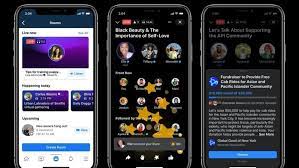With Clubhouse downloads slowing, and Twitter broadening access to its audio ‘Spaces’ tool, Facebook’s new audio social options look set to shake-up the trend even further, with the company now launching the first public test of its recently announced audio tools with users in Taiwan.
As reported by Bloomberg:
“Facebook is starting the first test of its Live Audio Rooms product with public figures and creators in Taiwan, part of an expansion of the company’s audio services.”
Facebook announced its coming audio social tools last month, which will eventually include audio-only Rooms, podcast listening and discovery tools, and a new ‘Soundbites’ functionality that will enable users to create short-form audio clips using a range of effects and tools.
But audio rooms, which is now getting a first public test, is the most direct assault on the Clubhouse-inspired trend.
As you can see here, Facebook’s audio rooms will look very much like Clubhouse’s own rooms UI, while Facebook is also adding its creator payment ‘Stars’ process into the new function, to ensure audio creators can monetize their efforts from the get-go.
Given that Facebook already supports video Rooms, scaling that back to audio shouldn’t be a huge leap, technically, but even so, Facebook is taking a measured approach to the roll-out.
As Bloomberg notes:
“For the initial rollout [in Taiwan], Facebook is limiting the test to what it says is a handful of public figures while planning to bring Live Audio Rooms to Facebook Groups as well.”
Providing audio social tools within groups could ultimately be the key to Facebook’s success with audio rooms – because while giving everyone access to audio rooms is great, the problem then becomes discovery, and finding the right audio rooms that are relevant to each users’ individual interests.
Clubhouse is already having issues with this element, with users complaining about too many notifications and too many rooms happening at once, diluting overall quality, from a personal engagement standpoint. Twitter’s Spaces are the same – while Twitter hasn’t worked out its Spaces discovery process as yet, it is possible to search for in-progress rooms if you have a moment and you’re looking to tune in.
The problem then, however, is similar to the problem with live-streaming – with so many people now able to stream, the sheer volume of options available makes it increasingly hard to sift through the content, and find anything relevant.
But by making groups a focus, Facebook eliminates this element – because the audio rooms that you see, and which are highlighted to you in-app, will be based on your noted interests. The in-progress streams displayed in your feed will stem from the groups that you’ve chosen to join, so it automatically addresses the discovery problem, without any algorithm intervention.
Which is why this is such a clever move from Zuck and Co. – and when you also consider that over 1,8 billion people are active in Facebook groups every month, it really could prove to be the killer element within Facebook’s broader audio social roll-out.
It’s a simple, but effective way to address what will become the next big problem with audio rooms, as usage expands. And while it may be annoying to see Facebook steal another app’s idea and dominate it once again, unless the other apps can improve discovery, that is, most likely, what’s going to happen – which is also why Reddit’s audio ‘ Reddit Talk’ option will also likely prove to be another winner in the audio social race in the longer term.
Which could also, eventually, leave Clubhouse on the outer.
It’s too early to write off any idea as yet, and I do think that both Twitter and Instagram, with its audio-only-live-streams, will see success among those looking to broadcast to larger audiences in-app.
But in terms of repeat usage, and maximizing engagement, it will come down to discovery, and Facebook, with groups, along with its other user data insights, is already in the lead in this respect.
If you were betting on the long-term, I’d be tipping Facebook to become the audio social leader in this respect.

Your point of view caught my eye and was very interesting. Thanks. I have a question for you.
Thanks for sharing. I read many of your blog posts, cool, your blog is very good. open a binance account
Thank you for your sharing. I am worried that I lack creative ideas. It is your article that makes me full of hope. Thank you. But, I have a question, can you help me? https://www.binance.info/es-AR/register?ref=UT2YTZSU